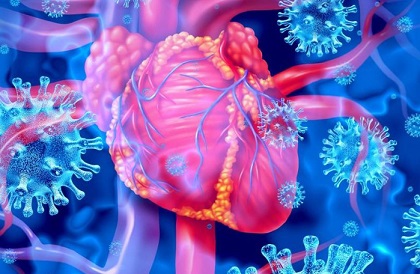Nikhil Prasad Fact checked by:Thailand Medical News Team Feb 10, 2024 1 year, 2 months, 5 days, 16 hours, 16 minutes ago
COVID-19 News: The emergence of the coronavirus disease 2019 (COVID-19) caused by severe acute respiratory syndrome coronavirus-2 (SARS-CoV-2) has evolved beyond its initial characterization as a respiratory infection. Extensive research has revealed a myriad of complications affecting various organs, with cardiac arrhythmias emerging as a significant concern. This
COVID-19 News report explores the intricate mechanisms underlying the occurrence of cardiac arrhythmias in individuals with COVID-19, shedding light on the pathophysiology and potential therapeutic insights.
 Mechanisms That Trigger Cardiac Arrhythmia In COVID-19
Mechanisms That Trigger Cardiac Arrhythmia In COVID-19
Thailand
Medical News had already previously covered a number of studies showing that arrhythmia is a common manifestation during the acute COVID-19 infection phase and even in the Post COVID phases.
https://www.thailandmedical.news/news/medical-news-researchers-claim-that-fibrinaloid-microclots-could-be-behind-atrial-fibrillation-relevant-for-sars-cov-2-context
https://www.thailandmedical.news/news/covid-19-news-swedish-study-validates-that-sars-cov-2-infections-causes-increased-risk-of-arrhythmias
https://www.thailandmedical.news/news/breaking-covid-19-news-sars-cov-2-infections-can-cause-brugada-syndrome
https://www.thailandmedical.news/news/covid-19-news-israeli-study-finds-that-sars-cov-2-infections-can-trigger-new-onset-atrial-fibrillation
https://www.thailandmedical.news/news/covid-19-news-mayo-clinic-study-shows-that-sars-cov-2-spike-protein-mediates-cardiomyocyte-fusion-leading-to-increased-arrhythmic-risk
https://www.thailandmedical.news/news/covid-19-news-researchers-warn-that-unique-types-of-sars-cov-2-related-arrhythmias-known-as-fascicular-tachycardia-are-materializin
g-in-children
https://www.thailandmedical.news/news/heart-failures-scientists-discover-that-defective-desmosomal-adhesion-causes-arrhythmogenic-cardiomyopathy,-a-heart-condition-affecting-young-adults
https://www.thailandmedical.news/news/breaking-new-york-study-finds-that-sars-cov-2-virus-damages-heart-pacemaker-cells-and-causes-arrhythmias
https://www.thailandmedical.news/news/scientist-from-john-hopkins-find-that-fat-intermingling-with-heart-scar-tissue-triggers-ventricular-arrhythmias-that-can-be-fatal
https://www.thailandmedical.news/news/latest-covid-19-news-sars-cov-2-causes-heart-muscle-cells-cardiomyocytes-to-fuse-and-disrupts-heart-s-electrical-rhythm
https://www.thailandmedical.news/news/arrhythmia-university-of-pennsylvania-researchers-say-that-critical-covid-19-patients-are-10-times-more-likely-to-develop-cardiac-arrest
Cardiac Complications in COVID-19
While pneumonia is the primary manifestation of COVID-19, reports increasingly highlight cardiac involvement, leading to complications such as systolic heart failure, myocarditis, pericarditis, atrial and ventricular arrhythmias, and thromboembolic events. Notably, arrhythmias contribute to the mortality rate in COVID-19 patients, even in those without a history of cardiovascular disease. Studies indicate that approximately 10% to 20% of COVID-19 patients experience arrhythmias, emphasizing the need for a comprehensive understanding of the mechanisms involved.
Incidence and Varieties of Arrhythmias
A comprehensive survey encompassing 4526 hospitalized COVID-19 patients demonstrated that 18.27% developed arrhythmias, with bradyarrhythmias and tachyarrhythmias constituting the majority. Among tachyarrhythmias, atrial arrhythmias accounted for 81.8%, while 20.7% were ventricular arrhythmias. Critical patients displayed a higher incidence of arrhythmia compared to non-critical cases. Notably, palpitations were reported as the initial symptom in about 7.3% of individuals contracting the virus.
Arrhythmia Types in COVID-19 Patients
Bradyarrhythmias, characterized by defects in the cardiac conduction system, included sinus bradycardia, first- and second-degree sinus block, and atrioventricular (AV) node defects. Severe sinus bradycardia and complete heart block were predominant among bradyarrhythmias. Tachyarrhythmias, on the other hand, featured atrial fibrillation (AF) as the most common type, with an incidence of 8%–13%. Ventricular arrhythmias, associated with prolonged QTc intervals, posed an increased risk of sudden cardiac death, particularly in patients with more severe disease and pre-existing cardiovascular conditions.
Mechanisms of Arrhythmias in COVID-19 Patients
Various factors contribute to arrhythmia in COVID-19 patients, including hypoxia, electrolyte imbalances, acute myocardial injury, and drug interactions. Importantly, direct infection of the heart by SARS-CoV-2 through angiotensin-converting enzyme 2 (ACE-2) receptors leads to myocarditis and pericarditis, triggering arrhythmias. Hypokalemia, observed in 5% of hospitalized patients, poses a life-threatening risk, with disruptions in the potassium pathway exacerbating arrhythmias.
Cytokine Storm: A Key Player
The severe immune response in COVID-19, characterized by a cytokine storm, plays a pivotal role in arrhythmogenesis. An imbalance between Th1 and Th2 cells results in the release of inflammatory cytokines such as IL-6, TNF-α, and IL-1, contributing to a systemic inflammatory response. These cytokines directly affect potassium and calcium channels in cardiomyocytes, leading to electrical and structural remodeling. IL-6, in particular, has been identified as a key cytokine associated with severe inflammatory responses and an increased risk of arrhythmias.
Myocardial Ischemia, Endothelial Dysfunction, and Electrolyte Imbalances
Excessive inflammatory responses induce microvascular dysfunction, resulting in coronary endothelial dysfunction and myocardial ischemia. IL-1B and TNF-α destroy the glycocalyx, activating glucosidases and promoting arterial hypertension. Furthermore, COVID-19 disrupts the ACE-2 receptor, leading to endothelial dysfunction through the Kallikrein–Bradykinin pathway, further contributing to arrhythmias. Electrolyte imbalances, especially hypokalemia, increase the susceptibility to arrhythmias in COVID-19 patients.
Arrhythmogenic Effects of Cytokines
The severity of COVID-19 is linked to the cytokine release syndrome (CRS), characterized by a rapid and extensive release of inflammatory cytokines. TNF-α, IL-6, and IL-1 play a crucial role in arrhythmogenesis through direct effects on cardiac regeneration and structural remodeling. Cytokines disrupt ion channels, particularly ryanodine receptors, leading to electrical imbalances and arrhythmias. IL-6, a major player in the pathogenesis of COVID-19, influences QTc prolongation, emphasizing its role in arrhythmogenesis.
Conclusion
COVID-19 has far-reaching implications beyond respiratory complications, with cardiac arrhythmias emerging as a critical concern. The interplay of factors, including direct viral infection, cytokine storm, myocardial ischemia, endothelial dysfunction, and electrolyte imbalances, contributes to the complex pathophysiology of arrhythmias in COVID-19 patients. A thorough understanding of these mechanisms is crucial for designing effective treatments and interventions to mitigate the impact of arrhythmias on the prognosis of individuals with COVID-19. Ongoing research is essential to unravel the intricacies of this relationship, paving the way for targeted therapies and improved patient outcomes.
This study review by researchers from Jinan Third People's Hospital-China and Shandong Second Provincial General Hospital-China was published in the peer reviewed journal: Annals of Noninvasive Electrocardiology (Wiley).
https://onlinelibrary.wiley.com/doi/10.1111/anec.13105
For the latest
COVID-19 News, keep on logging to Thailand Medical News.
Read Also:
https://www.thailandmedical.news/news/cleveland-clinic-and-northwestern-university-study-shows-that-metformin-could-be-repurposed-to-treat-atrial-fibrillation-findings-relevant-in-covid-se
https://www.thailandmedical.news/news/john-hopkins-proposes-new-echocardiogram-diagnostics-that-can-identify-covid-19-patients-that-are-at-risk-of-developing-atrial-fibrillation
https://www.thailandmedical.news/news/american-study-finds-that-sars-cov-2-nsp6,-nsp8-and-m-proteins-damage-human-cardiomyocytes-by-reducing-atp-levels
https://www.thailandmedical.news/news/thailand-medical-news-exclusive-deciphering-the-intricate-role-of-mirnas-in-heart-disorders-in-covid-19
https://www.thailandmedical.news/news/covid-19-news-university-of-queensland-led-study-shockingly-finds-that-sars-cov-2-infections-causes-dna-damage-to-heart-tissues
https://www.thailandmedical.news/news/warning-covid-19-clinical-care-experimental-drugs-being-tried-for-covid-19-can-cause-dangerous-abnormal-heart-rhythms
https://www.thailandmedical.news/news/research-on-arrhythmia-could-reduce-the-risk-of-sudden-cardiac-death
